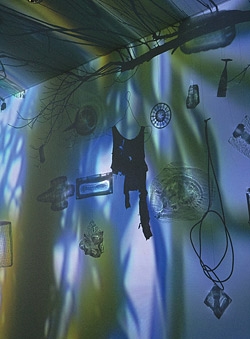A drop of humor for parched minds
Text: Kojima Yayoi
Portrait: Nagare Satoshi
“I call these my instant diamonds. I collect plastic packages with nothing written on them. They’re no longer of any use, but when light shines on them, they glitter.”
So saying, Pipilotti Rist strikes a cheeky pose in the middle of her work, Apple Tree Innocent On Diamond Hill. Open and sincere, but never lacking in humor, Rist was on characteristically candid form as she spoke of her first solo exhibition at a Japanese museum.

Apple Tree Innocent On Diamond Hill (Apfelbaum unschuldig auf dem Diamantenhugel) 2003
Video installation Installation view at Hara Museum of Contemporary Art Photo Nagare Satoshi
“I like the way the Hara Museum is in a residential area and used to be a private house, so the audience can turn up as if they were visiting a friend’s place,” she says. “I’m having fun setting up in response to that, like installing The Room, which uses furniture, in what used to be the living room. And upstairs, let me see, I’ve avoided tying myself down to a single concept; instead treating the space like a series of children’s rooms, as in this is the son’s room, and next to that is the daughter’s.”
The title of the exhibition comes from the Japanese word karakara which has two meanings: to be thirsty (nodo ga karakara) and to roar with laughter (karakara to warau). Rist explains:
“I’d like the art museum to be a place of comfort for parched minds. Just as our bodies take the nutrients they need from what we eat, and excrete what’s left over, so I believe our minds select and discard from the accumulated images seen with our eyes, and from our experiences. Because mind and body are connected.”
At first glance Rist, who for example uses video footage of her own body in her works, seems a confident, slightly larger than life figure, but she has a delicate, caring side as well. It’s a humanity also manifested in her works, which have none of the ponderous solemnity common to video installations. Is this because she makes a deliberate effort to be positive?
“I am indeed conscious of that. I don’t zoom in on the negative. Obviously I ‘ve no desire to make light of the sad things in life, or the philosophical, insoluble questions such as why we are born and die, but in my work rather than occupying a central position, you could say that stuff sort of hangs around in a corner. When people look at my works, I want them to feel they are no longer in a world of interminable solitude, even for just a few seconds.”
Here are spaces infused with an undercurrent of wounded gloom and loneliness, yet pulsing with lighthearted, positive thoughts. Nor should one overlook the toilet work Closed Circuit, a piece described slightly tongue-incheek by the artist as “a collaboration with the viewer”: shocking, but vintage Rist.
“That’s right. The content is yourself.”
Originally printed in ART iT 18 Winter/Spring 2008

Pipilotti Rist
Born 1962 in Grabs, Switzerland. Has produced video installations since the 1980s and presented them at major art museums and international exhibitions worldwide. Her one-woman show Pipilotti Rist: Karakara containing some of her best-known works, including Ever Is Over All, winner of a Premio 2000 award for outstanding achievement by a young artist at the 1997 Venice Biennale, was held at the Hara Museum of Contemporary Art (Tokyo) from November 2007 through February 2008.
